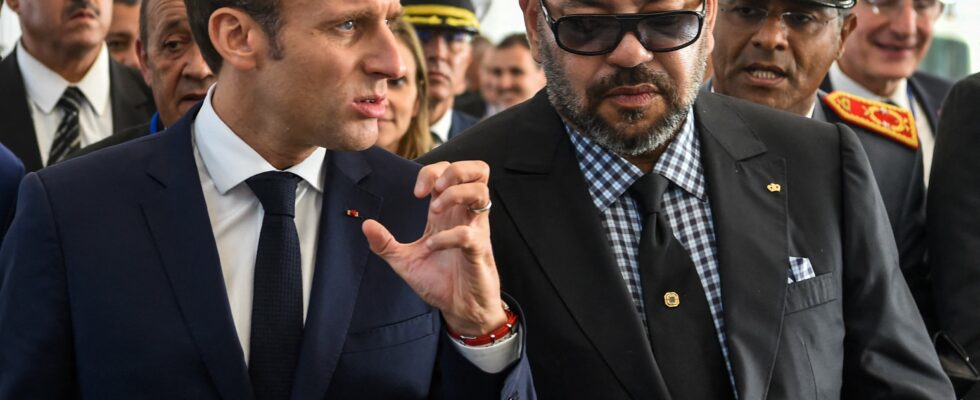After avoiding any protocol missteps in recent months, Emmanuel Macron goes to Rabat in a gesture of friendship which ends two years of tensions. The relationship between France and Morocco is punctuated by periods of proximity punctuated, from time to time, by frosty parentheses. The recent friendly exchanges between the French president and the king of Morocco constitute a new development which perfectly illustrates the ups and downs of a singular bilateral bond. The relationship between the two countries is deeply rooted in history and symbols. If the sultan of Morocco is today a king and the king of France is today a president, certain things have remained intact on both sides.
The presidency of the French Republic has preserved certain splendors inherited from royalty while the Moroccan monarchy has maintained a deeper continuity, remaining not only attached to the pageantry, but also to strict respect for the ancestral protocol of the sultanate . The latter, rooted in centuries of history and tradition, still infuses the daily life of the Cherifian kingdom today, constantly reaffirming the singularity of a monarchy which, while adapting to modern realities, has never renounced the essence of his heritage.
In Morocco, respect for monarchical codes remains imperative
The quarrel between France and Morocco would have been sealed during a telephone exchange between Emmanuel Macron and Mohammed VI which would have turned into a crime of lèse-majesté. In Morocco, as in Japan or the United Kingdom, respect for monarchical codes is imperative, not only for ordinary citizens, but also for foreign heads of state. Although the discussions can remain frank, they require a restraint that the French political world, sometimes perceived from the outside as a theater of one-upmanship and controversies, does not always master. However, diplomacy, from State to State and, even more, from Head of State to Head of State, requires a completely different frame of mind: that of pragmatism, restraint, moderation. Politics, often imbued with a certain passion, can tolerate poker moves and daring tactics. But diplomacy is another matter entirely. The latter requires a much more subtle game, where every word, every gesture counts, and where even the finest political strategist, such as Emmanuel Macron, must adjust his maneuvers to a context where protocol respect is at the foundation of the exchange.
Seen from Morocco, the recent quarrel appeared all the more incomprehensible as it seemed decoupled from daily reality. In Rabat, as in Paris, cultural, economic and human exchanges have never really stopped. French cultural centers in Morocco continue to attract crowds. The French language, although shaken by the rise of English, remains omnipresent in the streets and in schools. For many Moroccans, France remains a familiar horizon which, despite diplomatic turmoil, has never strayed too far. On the other side of the Mediterranean, Morocco, with its vitality and its contrasts, remains anchored in the minds of the French. Tourism, the cornerstone of the Moroccan economy, has not weakened. Even after the tragic Al-Haouz earthquake, which was thought likely to slow down the influx of visitors, Marrakech, Tangier, Dakhla quickly found their loyal visitors. Far from being discouraged, the French flocked again, marking with their presence a discreet but very real solidarity.
Morocco’s influence in sub-Saharan Africa, an essential lever
These inexhaustible links are vital for France in Africa. The latter needs a safe and reliable ally in the face of the decline of its influence in West Africa and the Sahel. The withdrawal of French troops from Mali and Niger as well as the creation of the Alliance of Sahel States, which rejects traditional regional cooperation frameworks, shows a growing desire for freedom from France. In this context, Paris turns to Rabat. Morocco’s influence in sub-Saharan Africa, particularly through strategic investments and a well-established diplomatic network, is becoming an essential lever.
Many agreements will be signed during Emmanuel Macron’s visit, important decisions will be taken, especially since France, through its head of state, has today positioned itself on Morocco’s side on the issue. of Western Sahara, considering that the autonomy plan under Moroccan sovereignty is the only viable solution to a dispute which has lasted too long. By readjusting as usual, France and Morocco maintain a relatively unique alliance in the regional landscape. The strength of this relationship lies in the ability of the two countries to overcome moments of friction without ever breaking off dialogue. Far from polite diplomatic discourse, these tensions reveal a reality: Rabat and Paris know that they are stronger when they move forward together. Common interests, whether economic, security, cultural or environmental, require permanent dialogue. Beyond misunderstandings, divergences and occasional tensions, it is in this ability to overcome crises to better find each other that the real secret of the Franco-Moroccan couple lies.
* A political advisor to numerous Arab governments, Zaid M. Belbagi, Moroccan and British, is the chairman of Hardcastle, a strategic consulting firm based in London.
.
